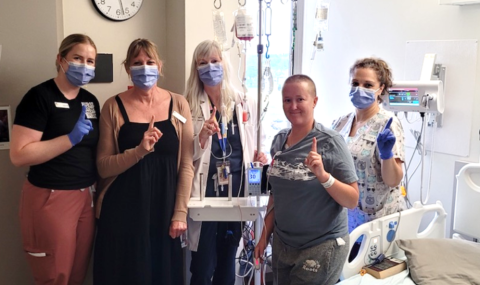At LHSC, care partners and family members play an important role in preventing and reducing the impact of delirium for at-risk patients.
The following information will help you to support a person experiencing delirium.
How to help someone experiencing delirium
You can help to support a person experiencing delirium by trying the six proven strategies to prevent delirium in older adults. These include:
- Stimulating the mind
- Ask loved ones to visit
- Bring a calendar or clock, and remind them what day/month/year and time it is
- Remind them where they are and that they are safe
- Read them books, play music, offer mind challenge games (such as crossword puzzles)
- Moving
- Encourage time out of bed and time up in the chair during the day
- Encourage them to work with their nurse, personal support worker, physiotherapist, or occupational therapist
- Sleeping Well
- During the day, open the window shades/blinds
- At night/bedtime, reduce noise, close the window shades/blinds, and turn off the lights
- Seeing and Hearing
- Bring hearing aids and glasses, and encourage their use
- Staying Hydrated
- Encourage fluid intake throughout the day to avoid dehydration
- Eating
- Bring dentures, and encourage their use
- Encourage intake of nutritious food throughout the day
- Join for mealtimes, if possible
How to talk with someone experiencing delirium
It can be hard to talk to someone with delirium, but it's important to be patient and understanding. Here are some helpful tips:
- Use calm words and plain language that is supportive and reassuring. Speak clearly, gently and use short, simple sentences. Repeat things if needed.
- Focus on one topic at a time to make conversations easier to follow.
- Avoid asking too many questions, as it may be confusing or overwhelming.
- It’s better to offer simple suggestions. For example, do not ask “Do you want to get out of bed and sit in a chair?”. Instead say, “Let’s get out of bed and sit in the chair.”.
- If they are confused or scared, remind them of where they are and what is happening. Use a calm and soothing voice.
- If they are upset, focused on a topic that is making them agitated, or if they are hallucinating, stay calm, reassure them and do not argue with them.
- For example, you can say, “I understand it’s scary to hear voices of people you cannot see. But look, there’s nobody in the room but us.”
Treating delirium
Delirium can last from hours to months. There are no specific treatments or medications to treat delirium, although the care team may prescribe medications to treat certain delirium symptoms. For example, if the patient is unable to sleep, they may be prescribed melatonin.
Some patients with delirium get much better when they go home and are in a familiar environment. Others can still have delirium symptoms months after the cause of their delirium is treated.
How to support recovery at home
The following tips can help you support recovery from delirium after the person you care for returns home.
- Keep their mind active by reading them books, playing music, offering mind challenge games (such as crossword puzzles), etc. If an activity is overwhelming for them, make it simpler.
- Encourage them to be active.
- Examples include sitting in a chair, going for a walk, or doing leg and arm exercises.
- Help them adjust to being home by:
- Reminding them of the date and time
- Keeping familiar items nearby, like family photos
- Sharing news about their friends and family
- Keep them updated on current events by reading the newspaper or showing them news programs.
- Schedule a follow-up appointment with their primary care provider.
How to help prevent delirium around a surgical procedure
You can help to prevent or reduce the impact of delirium by following the six proven strategies to prevent delirium in older adults.


